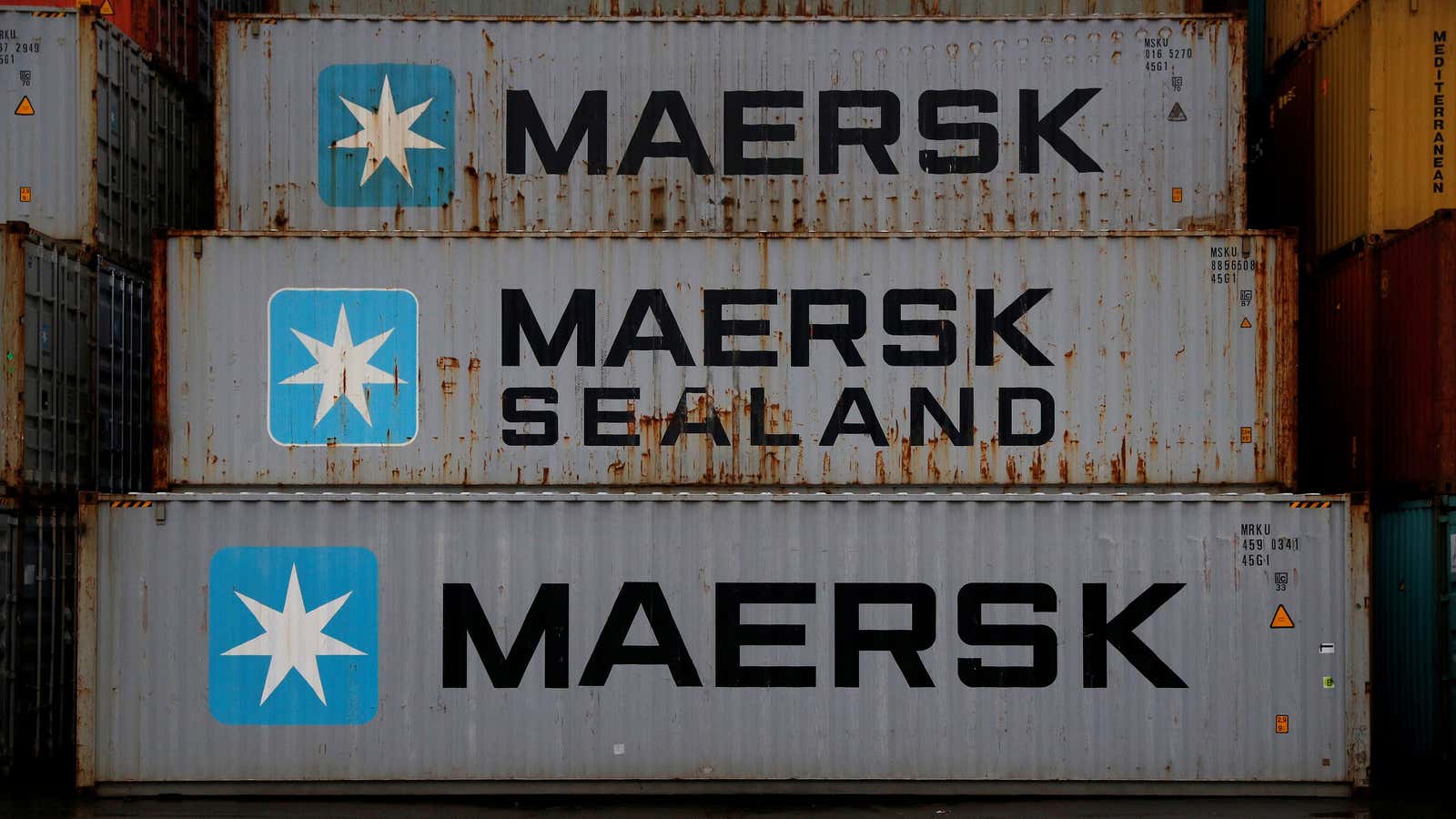A.P. Moeller Maersk, the Danish shipping giant, announced an expansion of its air freight business this week, dipping into the record profits the company is earning during the pandemic-induced supply chain chaos. The deal included acquiring Senator, a German logistics company that runs 19 cargo flights a week around the world , for $644 million, two new Boeing 777F cargo planes that sell for about $350 million each in the open market, and leasing three more cargo planes.
The economic motives are simple. The price per kilogram of air cargo has tripled from pre-pandemic rates, from $3.14/kg in January 2020, to $9.74/kg in September 2021, a record high, according to data from the Baltic Exchange analyzed by Air Cargo News, a trade publication. The supply chain continues to be snarled with record delays, and sending goods by air is faster than an ocean crossing.
“We are now ramping up our air freight capacity significantly and creating a broader network to cater even better for the needs of customers,” said Vincent Clerc, the head of ocean and logistics at Maersk, in a statement. In its third-quarter results released this week, Maersk’s revenues are up 68% from the previous year to $16.6 billion.
But Maersk, which is the world’s largest shipping container line, has positioned itself as a leader in decarbonizing the industry, and expanding into air freight illustrates the tension between a company’s professed sustainability goals and the pursuit of economic gain.
Carbon emissions of air versus ocean
Air cargo releases 22 times more carbon dioxide (CO2) as ocean shipping for each ton of goods transported.
Transport emissions are measured by how much CO2 is emitted for every ton of cargo traveling a mile, or CO2/tmi. According to US Environmental Protection Agency data analyzed by Freight Waves, a trade publication, shipping releases 59 grams of CO2/tmi versus air freight, which releases 1,308 grams of CO2/tmi.
🎧 For more intel on carbon emissions, listen to the Quartz Obsession podcast episode on flying business class. Or subscribe via: Apple Podcasts | Spotify | Google | Stitcher.
In terms of emissions, shipping is the most efficient way to move international cargo. The industry’s significant contribution to global emissions, about 3% annually, or more than all emissions produced in the UK and France combined, is a product of the sheer volume of goods it moves. Shipping delivers 11 billion tons annually, or about 90% of international trade, compared to the approximately 140,000 tons of cargo that travels by air a year, or about 1% of global trade.
Maersk’s investment into air freight shows “they’re not really serious about tackling the climate emergency,” said Lucy Gilliam, senior policy analyst for Seas at Risk, an environmental organization.
Maersk’s sustainability ambitions
Maersk has been outspoken about the need for shipping to reduce its emissions. “The time to act is now, if we are to solve shipping’s climate challenge,” Soren Skou, Maersk’s CEO, said in August, when the company announced that it would be acquiring eight lower-carbon, methanol-burning ships. This week (Nov. 3), John Kerry, the US’s special envoy for climate, name-checked Maersk during COP26, the global climate meeting in Glasgow, as a company progressive about climate action.
In addition to demonstration ships, Maersk has invested in an electrofuels startup and a company that produces green methanol. Last year, it was among the donors in the Maersk Mc-Kinney Moeller Center for Zero Carbon Shipping, a research organization.
The company has publicly called for a carbon tax of $150 per ton of marine fuel. However, in another mismatch between intentions and action, Maersk, along with CMA CGM, another shipping line, has lobbied for international shipping to be excluded from the European Union’s Emissions Trading System, which puts a price on pollution.
“We are aware of the environmental challenges to air freight but clearly air freight is a crucial enabler for our customers to get the flexibility they need for their global supply chains so for us this is a must-do move,” Maersk said in an emailed response to Quartz.
The company also said that “achieving carbon neutrality is a strategic imperative for Maersk.” However, it noted that sustainable aviation fuel (SAF) is in the very early stages of development, and the technology is not likely to be commercially available a decade, if not more.
“Currently we do not know how to source sufficient SAF, though we will leverage our efforts within carbon neutral fuel development and sourcing to include both ocean and air. As in ocean, from a sustainability standpoint, getting green fuel for air is the biggest challenge,” Maersk said. “But we believe that it is possible to speed up the scalability of green fuels over the next years. We are going to work hard to make it possible.”
The path to decarbonization
But environmentalists think the shipping giant should be doing more.
“The amount of money they are investing in clean shipping is peanuts,” compared to their profits, said Gilliam, of Seas at Risk. The Global Maritime Forum, a think tank in which Maersk is listed as a partner, estimates that decarbonizing the shipping industry will cost $1.4-$1.9 trillion dollars over 30 years.
The answer, Gilliam says, is regulation. The International Civil Aviation Organization, and the International Maritime Organization, both UN agencies, have faced broad condemnation for insufficient regulations that do not bring down emissions, and leave companies like Maersk to lead the industry in climate action. With stronger rules in shipping, commitment to climate action doesn’t have to falter in the face of economic temptation.
